Michael Patrick Hicks's Blog, page 8
October 26, 2018
Review: Exit Strategy (The Murderbot Diaries #4) by Martha Wells [audiobook]
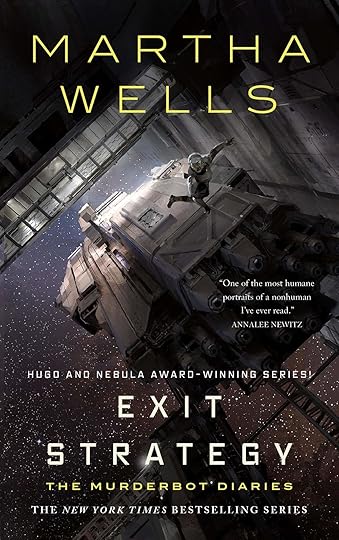
Exit Strategy: The Murderbot Diaries
By Martha Wells
My rating: 3 of 5 stars
Having already reviewed the previous three installments of Martha Wells's The Muderbot Diaries, I'm not sure I have much left to say about this series. In fact, there's a line toward the end of Exit Strategy that sums it up my general thoughts to this series of audiobooks as a whole pretty well (although since I listened to this in audiobook I'll have to paraphrase the sentiment): "It's a good story, even if the tone is a bit dry."
The dryness in tone largely stems from narrator Kevin R. Free, who does a serviceable job here but who, also, over the course of four books has yet to impress me performance-wise. The character of Muderbot strikes me as having more in the way of feelings and expressions, even as an artificial intelligence, than Free's interpretation allows. Free slips into some fairly monotone deliveries, which absolutely kill my attention. It's hard to pay much attention to a story when a narrator cannot engage you, and unfortunately I found myself mentally checking out and wandering away from Exit Strategy frequently.
Story-wise, Exit Strategy is simple, even for a novella. Wells brings back the cast of human characters from book #1 as Murderbot's investigation into the evil corporation GrayCris comes full circle and he returns to deliver evidence of this company's conspiracy to Dr. Mensah. Easy right?
Well, there's a few wrinkles here and there, but as with the prior episodes in this series it's mostly pretty straight-forward. Wells continues to provide some interesting doses of Murderbot's introspection and its interaction with other artificial intelligences and bots proves just as intriguing as its relationships with humans.
Murderbot continues to be a fascinating character in its own right, and even in this fourth novella Wells still finds new facets of this rogue SecUnit's personality and motivations. As far as antisocial killing machines who are addicted to intergalactic soap operas, Murderbot is a surprisingly charming character and with a full-length novel due out in 2020 I'm happy to know neither Wells nor Tor are finished with its story just yet.
View all my reviews
Published on October 26, 2018 06:10
October 25, 2018
Review: Kill for Satan! by Bryan Smith
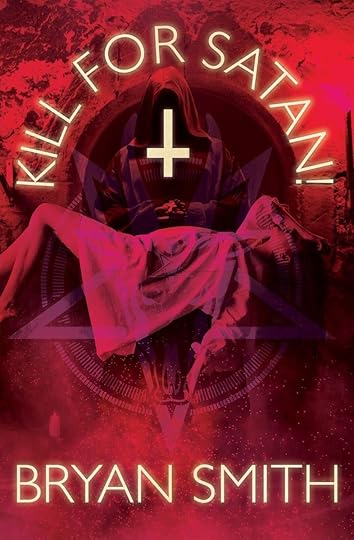
Kill For Satan!
By Bryan Smith
My rating: 4 of 5 stars
Kill for Satan! might be one of the most aptly named horror books I've read recently, its title perfectly capturing the breadth and depth of this particular story in three short, simple words. Bryan Smith's latest is dense with blood and mayhem, even if the plot and characters are paper thin, and its hundred or so pages move along pretty damn swiftly.
Plot-wise, Kill for Satan! is every bit as simple as its title indicates. Littleburg's Satanic coven is commanded by their Dark Lord to slaughter the tiny town's virgins on Halloween. That's it! This is an easy peasy, one and done kind of read. What you see is exactly what you get, and you best damn not ask for anything more, cause you ain't getting it!
Over the course of fourteen chapters (plus an epilogue!), Smith sends a spate of Satan worshipers door-to-door to carry out their kill spree. The story, what little of it there is, is primarily focused on Sindie and Micah, a pair of black-clad, machete wielding lovebirds. There's also Seth and Caitlin, two teens holed up in church for their twice-weekly Youth Abstinence League of Littleburg (YALL, hilariously enough, given the book's Bible Belt setting). Seth has the hots for her, and she probably doesn't even know he's alive.
Kill for Satan! is a quick and dirty romp of mad-dash carnage, written with a measure of tongue-in-cheek quirkiness that regularly reminds you Smith was having an abundantly good time writing this sucker, and probably cackling madly with glee along the way. Consider Micah, a recent convert to Sindie's devil worshiping ways, who muses over the escalating violence, that "one thing he knew from the two midnight masses he’d attended, there were a lot of Satanists in this little town. Like, a really shockingly high number of them." Or a brief explanation to a would-be victim during a familial massacre: "I'm sorry, sweetie. I do love you. But I love Satan more."
Published by Grindhouse Press, Kill for Satan! fits perfectly within the ethos of this particular small-press publisher. It's sleazy, cheesy, violent B-movie-styled slasher pulp, and it makes for an interesting second billing to the publisher's summer release, Cockblock. The artistic merit of high literature, depth of theme, and deeply drawn, soul-filled characters doesn't so much take the backseat as it much as it gets run over, backed over, and then ran over again and ground into the pavement by the more exploitative elements, with Smith focusing solely on sex and violence for this novella's slim duration. And, by the way, I do mean this in the best, most affectionate way possible! This is a compliment!
The aim of Kill for Satan! successfully hits its target. I got almost exactly what I wanted and expected from Smith's book. I do wish, though, that I could have gotten treated to a few extra bits of Shock Theater, and an extra chapter or two to familiarize ourselves with Seth and Caitlin wouldn't have hurt any, either. But you know what? It's a fair trade-off for that exceptionally, fantastically, terrifically composed Matthew Revert cover art. Hot damn, is that cover ever a beauty.
Smith's novella gets by purely on its trashy entertainment value and ridiculously high kill count. If you're looking for a book solely about Satanists killing everyfuckingbody, you'd be really hard pressed to do better than Kill for Satan!.
View all my reviews
Published on October 25, 2018 13:25
Review: Hell Divers IV: Wolves by Nicholas Sansbury Smith
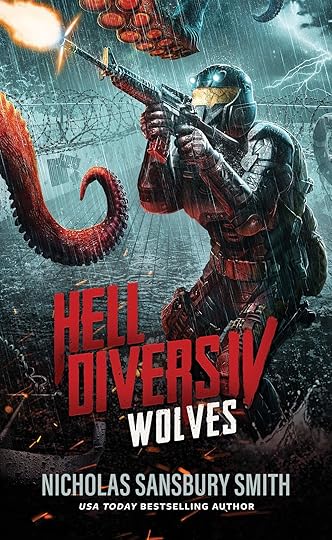
Hell Divers IV: Wolves (Hell Divers Series, Book 4)
By Nicholas Sansbury Smith
My rating: 4 of 5 stars
In the final moments of the third Hell Divers novel, Deliverance, Nicholas Sansbury Smith promised to change up the formula a bit and deliver a fourth novel covering some terrain we hadn't seen too much of in this sky- and radioactive wastelands-focused series. Smith immediately delivers on that promise in the opening chapter of Wolves, shifting the focus of his series from the deadly skies to the equally terrifying seas.
As a fan of aquatic horror and survival at sea stories, this is very much a welcome expansion to the Hell Divers canon, but it's not all smooth sailing for the book's characters. Xavier "X" Rodriguez and his partner Magnolia Katib has hit the high seas on a mission of revenge, aiming to track down the Cazadores, a cannibalistic cult of killers, and lead the small remnants of humanity of the Metal Islands, possibly the closest thing left to paradise on Earth.
Although X's adventures by boat are a large part of Wolves's focus, Smith hasn't forgotten about the airships and their crew. The addition of the airship Deliverance has helped make life more comfortable for those aboard the Hive, but they can't get too cozy just yet. After all, it wouldn't be a very exciting story if half the book's characters were able to just lounge about sipping tea. There's still plenty of action left for those characters in the skies, and the fresh squadron of Hell Divers manage to find themselves in way over their heads in short order.
Smith keeps this book running right from the opening pages, with the pace cranked all the way up to frenetic, juggling some big action set pieces between both the A- and B-plots. Wolves is a fast, energetic read, and it's easy to sink into the narrative. The climax is exciting as hell with its Mad Max-at-sea action - a welcome source of post-apocalyptic inspiration, and one I hope Smith elaborates on further in the next book.
However, with a fifth Hell Divers title on the way in the first half of 2019, a lot of Wolves feels like prelude, giving it a middle-child vibe a lot of series suffer from. Wolves cannot resolve all of its plot elements, and much of what's here is set-up for Captives, purportedly the series finale, to resolve. That said, Smith certainly packs Wolves full of new material, expanding on the historical record of his series and introducing some new and highly durable threats that I hope to see more of soon.
Between the change of scenery and a few new enemies for X and his fellow Hell Divers to confront, Smith has injected a welcome bit of freshness into the end-game of his series. Wolves sets the stage for the grand finale, but as the Hell Divers series as a whole has shown, for Smith, the sky isn't the limit - it's just a good place to start.
[Note: I received an advanced reading copy of this title from the author.]
View all my reviews
Published on October 25, 2018 06:58
October 23, 2018
Review: Mister Jack by Chris Kosarich
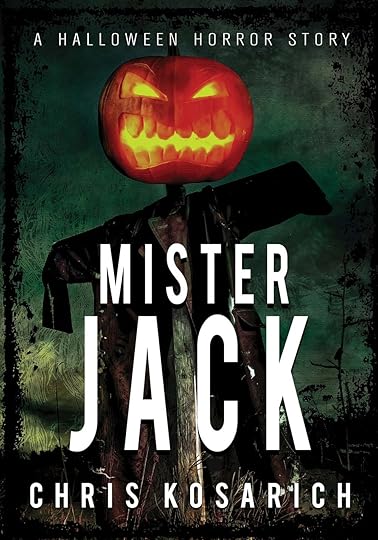
Mister Jack
By Chris Kosarich
My rating: 4 of 5 stars
Let me begin with a small admission, dear readers. I am not a big fan of framed narratives - a story being told within a story - and Mister Jack is constructed in such a fashion. Once I glommed onto the type of story Mister Jack was going to be, my defenses were raised. I hate to admit it, but Chris Kosarich had to overcome a fair bit of bias on my part; unfair to him, perhaps, but still true. He was going to have to tell me one hell of a story to keep my attention and overcome my ingrained dislike of framed narratives. Did it work? Well, if you noticed the four-star rating already, you probably have a pretty good inkling of whether or not Kosarich was successful.
Readers are introduced to a trio of high schoolers heading out to a Halloween party, but first they have an important stop to make. It's high school tradition for kids to venture out to the decrepit, possibly abandoned, homestead of Josie Howard - a witch, according to local legend- and egg and toilet paper her house. Before they can get on with their prank, though, they find themselves face to face with Howard and are soon enraptured by her story of the urban legend, Mister Jack.
Mister Jack is a pretty simple story when all is said and done. Mike, Tully, and Maddie are there primarily to just sit around and listen to Josie's story, and the bulk of this small novella's page count is dedicated to Howard's recitation. Even though this type of narrative isn't my favorite, I still found myself highly interested in Kosarich's book for a few reasons.
First off, Kosarich absolutely nails the voice of Josie. I had no trouble picturing her or hearing her voice in my head, right down to her southern Floridian lilt. She is positively engaging, and thankfully so is her story. The legend of Mister Jack himself is the second reason Mister Jack the book worked so well for me. His is the type of legend that grabs you by the shirt collar and demands attention. The meat of Jack's story is compelling enough that I got over my own personal hurdles with framing conventions and I was able to get lost in Josie's story. Kosarich's framing gambit absolutely paid off, and while I'm still not a fan of this particular narrative technique I do have to give the author plenty of credit for making it work so well.
In presenting the story of Mister Jack within the overarching story of these three high schoolers and their encounter with Josie, Kosarich managed to pique my curiosity a few times. Although I haven't read Kosarich's previous works, it's clear he's an author who knows what he's doing. He plants a few seeds throughout Josie's narration that call into question her reliability as a narrator and why she has chosen this particular trio of teens to engage with. As engaging as the story of Mister Jack was, I was equally invested in uncovering Josie's motivations, motivations that provided an extra layer of much-welcomed tension and mystery.
Mister Jack is packed with a surprising amount of story that belies its rather short page count. There's enough meat built into this story for Kosarich to write a book or two about Summerdale's past and Jack's legacy, and if he ever elects to return to this particular urban legend I am absolutely here for it. The character of Mister Jack has so much freaking potential it would be a shame if we're not treated to a few more stories of his, and I'm hoping the author is now busy figuring out ways to shock and entertain us with more of Jack's Halloween exploits.
View all my reviews
Published on October 23, 2018 06:00
October 22, 2018
Review: Camp Slasher by Dan Padavona
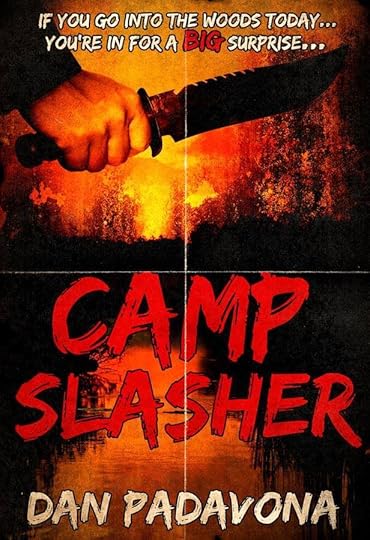
Camp Slasher: A gory dark horror novel
By Dan Padavona
My rating: 4 of 5 stars
Camp Slasher, Dan Padavona’s latest, is the type of book whose title lets you know exactly what you’re getting into.
Cut from the same cloth as horror slasher flicks like Friday the 13th and Sleepaway Camp, Padavona unleashes merciless violence upon a group of people working to rebuild the defunct Camp Black Bear. While the group struggles with clearing out an infestation of wolf spiders and struggling with the dramatics of interpersonal conflicts, a deranged killer lurks in the woods nearby, watching and waiting for his perfect moment to strike.
It’s all pretty standard killer camp stuff, but it doesn’t disappoint, particularly if you’re a sucker for these types of stories. Padavona does find a unique entry point into the mayhem, though, by injecting a worthwhile subplot of police drama and investigation into the disappearance of a woman and a group of hikers.
I was a bit surprised by the focus on the police officers, actually, having expected Camp Slasher to focus entirely on Camp Black Bear. Padavona spends a fair amount of time on political intrigue – Sheriff Bracken McCain is up for reelection, and one his deputies, a slimeball appropriately named Craven, is running against him and working hard to undercut everything Bracken does along the way. There’s a goodly amount of conflict baked into their relationship and Craven is one of those love-to-hate characters.
In fact, there’s a number of loathsome men populating Camp Slasher that readers will be pining to see meet their gruesome ends. Padavona stocks Camp Black Bear with perhaps more than its fair share of dangerously entitled men that you just cannot wait to see maimed and butchered, and while it strains credulity just a bit it does lead to some wonderfully satisfying scenes of tension as things spiral out of control.
Credit where it’s due, Padavona knows how to write some grisly, violent scenes. This is evident right the book’s opening chapter, which, if it weren’t already clear from the title, lets you know this is a horror book that won’t be pulling any punches or shying away from the gory bits. Even tense scenes of potential violence are deftly executed. There’s an early scene involving a cabin full of spiders that had this arachnophobe squirming in his seat, all hairs standing on end, thanks to some colorful word choices and stage-setting on the author’s part that let me see and hear things a bit too well.
Deftly paced and loaded with plenty of drama that helps pave the way for a bit of the ol’ ultra-violence, Camp Slasher should help satisfy those cravings for some 80s-styled summer vacation pulp horror. If you’ve been missing Jason Voorhees, Padavona has a new maniacal woodsman to introduce you to.
[Note: I received an advance reading copy of this title from the author.]
View all my reviews
Published on October 22, 2018 05:55
October 21, 2018
Review: Thin Air by Richard K. Morgan
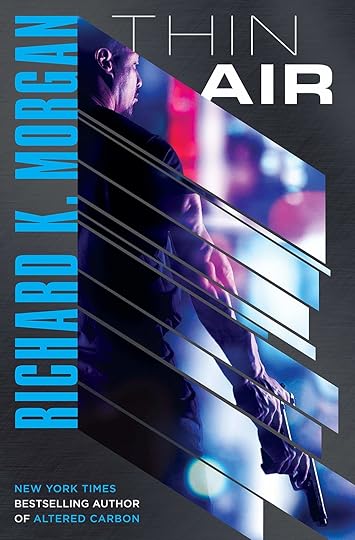
Thin Air: A Novel
By Richard K. Morgan
My rating: 5 of 5 stars
I've long been a fan of Richard K. Morgan's style of science fiction writing and his return to the field after a decade-long absence is certainly welcome, with Thin Air doing much to remind me why I fell in love with this author's work to begin with.
Morgan writes sci-fi that is heavily, heavily influenced by hard-boiled mysteries. Beneath all the whiz-bang high-tech wrappings of interstellar colonization, cybernetic augments, and next-gen weaponry, there's a grizzled take on the classic PI - down on his luck, hard drinking, smartly armed, and chasing dames - and a planet-sized dose of noir. Thin Air is gritty, like a mouthful of coffee grounds and gravel, and just as grim and bloody as you could imagine.
On Mars, one lucky lottery winner has won his ticket back to Earth. Only problem is, he's dead, a complication that has triggered a planet-wide audit by the colony's Earth overseers. Hakan Veil is a former overrider - a genetically augmented warrior who has had his license to kill revoked and has been exiled to Mars. He's just murdered a local gangster, which has put him in police custody. He can make the charges disappear if he can protect the auditor, Madison Madekwe, and keep her safe from whoever's murdered the lottery winner. Veil makes the deal and finds himself up to his neck in organized crime, terrorist factions, killers, and political intrigue...and then things go even further south from there.
Thin Air is a densely packed narrative, and Morgan has done an excellent job building up the world of Mars and delivering a cast of deeply complicated characters. Loyalties are ever-shifting, and there's almost as many motives to the madness Veil finds himself lost in as there are Martians. The plot spins wildly upon each new revelation, and the scope of this particular story grows broader and broader. I have to applaud Morgan for being able to keep all the twists, turns, and back-stabbings straight, because there are a lot of moving pieces and characters to keep track of here. I honestly wouldn't mind seeing the notes and outlines he must have created to keep this story flowing as impressively as it does. Thin Air is a perfect example of how characters serve the plot, and the reasons behind their motivations are just as labyrinthine as the story Morgan is telling.
And, of course, there is plenty of sex and violence to move that story forward - it wouldn't really be a Richard K. Morgan book without those elements appearing rather frequently in grisly, graphic abundance. Veil is a lab-engineering killing machine; murder is literally built into his DNA, so expect a no-holds barred approach to the action sequences here. Ditto the book's sex scenes. Veil may have been coerced into playing the role of a private dick, but of this latter, well, it ain't all that private and Veil isn't the kind of guy who lets nearly being murdered with a military-grade rocket prevent him from shacking up with the stripper next door.
After spending the better part of a decade crafting a trilogy of fantasy novels, it's pretty damn thrilling to have Morgan back in the game of telling ultra-gritty, hard-boiled futuristic noir. I've missed his contributions to science fiction, and Thin Air didn't disappoint in the least. This sucker is chock full of crime, conspiracy, action, and subterfuge, and Morgan is a goddamned master, at the top of his game right here. I just hope I don't have to wait another decade for his next work of dark sci-fi, but if it's as good as Thin Air, I certainly won't complain.
[Note: I received an advance reading copy of Thin Air from the publisher, Del Rey Books, via NetGalley.]
View all my reviews
Published on October 21, 2018 14:29
October 19, 2018
Review: Rogue Protocol (The Murderbot Diaries #3) by Martha Wells [audiobook]
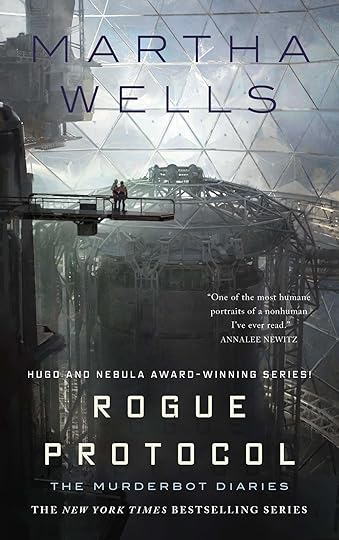
Rogue Protocol: The Murderbot Diaries
By Martha Wells
My rating: 3 of 5 stars
This third (and penultimate) entry in Martha Wells's The Murderbot Diaries picks up immediately after the prior episode Artificial Condition, setting Murderbot off a new adventure with a new group of humans and bots while continuing its search for evidence against the evil corporation, GrayCris.
Having been binge-listening to The Murderbot Diaries, I have to admit the formulaic structure of these episodes is getting a bit creaky. Both Artificial Condition and Rogue Protocol follow the exact same story beats - Murderbot sneaks aboard a ship, encounters and befriends an artificial intelligence aboard ship, then saves the humans. There's not a lot of room for surprise, and the similar length both of these entries share make these events feel very scheduled, the plot operating like clockwork in accordance to a rigorous three act structure. You could almost time the occurrence of both books' events right down the minute.
While the structure of The Murderbot Diaries is by now intimately familiar, Wells does find a few spots to make fresh. The character dynamics and personalities of Rogue Protocol are almost a direct inverse of the prior episode, with Murderbot attempting to hide from the ship's crew before facing its own natural instincts (or perhaps its base SecUnit coding is more accurate) to protect them. We get another view of human-AI interaction, helping to illustrate the diversity among even artificial man-made constructs. Some robots are forced into mortal combat for their owner's entertainment, while others are infantilized and treated more like pets. Actual equality between man and machine, though, is awfully rare and Murderbot at times struggles between its nature as a rogue unit and the expectations placed upon it by humans that view it as nothing more than a standard factory-line killing machine. This societal dimension of the story still has plenty of material left for Wells to explore, and it's been one of the highlights of the series thus far.
Kevin R. Free has settled into narrating duties, having found a comfortable style in the prior entry that he carries over to Rogue Protocol. There's perhaps little point in reinventing the wheel, narration-wise, three books into the series, and whether you dug Free's style or not thus far, you'll know exactly what to expect here. For me, it's a bit too gentle and even keel of a reading and the easy-listening nature of it makes my mind susceptible to wandering.
Rogue Protocol keeps on keeping on as the series builds towards its finale in book #4. Diving into this one right on the heels of its predecessor, though, makes the story feel a bit too repetitive as Wells eschews any narrative risks in order to deliver a safe story built in the exact same mold as book #2. If you've been enjoying this series so far, Rogue Protocol certainly isn't a deal breaker by any means, but it's not exactly fresh and exciting either.
View all my reviews
Published on October 19, 2018 06:49
October 16, 2018
Review: Artificial Condition (The Murderbot Diaries #2) by Martha Wells [audiobook]
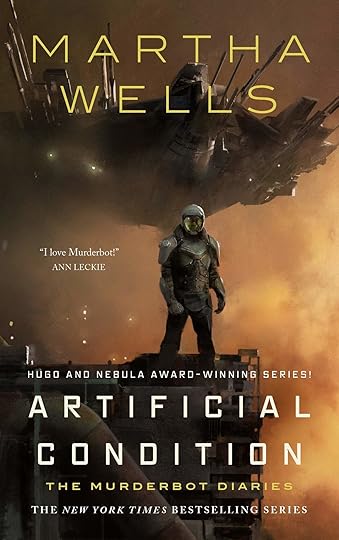
Artificial Condition: The Murderbot Diaries
By Martha Wells
My rating: 4 of 5 stars
The Murderbot Diaries has thus far been an excellent introduction to the work of Martha Wells, a new-to-me author, and she is proving to be quite adept at serialized story-telling. Artificial Condition picks up shortly after the finale of All Systems Red, with the murderbot operating as an independent free-agent.
As a formerly-corporate owned SecUnit cyborg, Murderbot's memories were routinely purged, although a few still linger, particularly those surrounding the murder of 57 miners in the wake of a malfunction. Murderbot wants answers, and its journey back to the RaviHyral mining facility sees it taking passage aboard a bot-operated research vessel and getting hired on as a security consultant for a team of scientists.
As with All Systems Red, Artificial Condition presents a pretty basic story enlivened by the character of Murderbot itself. In the prior episode, it was Murderbot's interactions with its human employers that provided a lot of that book's high points. Here, much of the fun lies in seeing how Murderbot relates and responds to the shuttle bot operator, ART (yes, ART is an acronym, but to reveal what it stands for spoils the fun of discovery!).
Wells does a fantastic job bringing the construct of Murderbot to life, exploring the various facets of its artificial intelligence. While Murderbot is a machine first and foremost - and the brief action scenes illustrate quite well the proficiency in violence for which it was built - it still presents an intriguing amount of psychological depth and self-awareness, filtered through a pretty unique perspective.
Returning to narrate is Kevin R. Free, who manages a livelier performance after a fairly monotone reading in the previous go-round. As far as listening experiences go, I haven't found his narration thus far to be completely engrossing, and while I'm not familiar with his work outside of The Murderbot Diaries I do appreciate the growth exhibited by Free over the course of these two novellas. Artificial Condition presents a better narration than book #1, but it's still sadly easy to mentally disengage from and let your mind wander.
Although this audiobook wasn't entirely successful in holding my attention and consistently captivating me, I still found myself enjoying it, even if I did have to rewind a few sections to see what I had missed during moments of distraction. Murderbot is a great, and surprisingly relatable, character, and Artificial Condition helps push the overarching narrative a little bit further forward. Now, onto Rogue Protocol!
View all my reviews
Published on October 16, 2018 06:30
October 11, 2018
Review: All Systems Red (The Murderbot Diaries #1) by Martha Wells [audiobook]
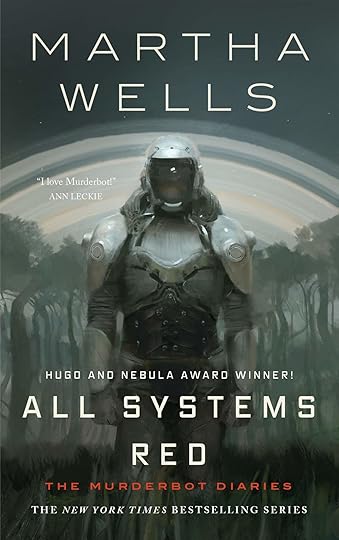
All Systems Red: The Murderbot Diaries
By Martha Wells
My rating: 4 of 5 stars
All Systems Red, the first installment in Martha Wells' The Murderbot Diaries and winner of the 2018 Hugo, Locus, and Nebula Awards, is a heck of a lot of fun. This is a novella, so the premise is pretty simple - a rogue android has to help keep the humans who have contracted it for security alive during a planetary survey mission. Naturally, Wells inserts a few wrinkles along the way that point to something larger and more nefarious. A murderbot has to earn its pay, after all.
What separates All Systems Red from the pack of droid hero science fiction is the character of Murderbot itself. Murderbot has hacked the governor module that controls and dictates its behavior, making it a free agent, if not for the fact that it has to hide this tidbit of information from its human employers. Despite being fully self-aware and keenly intelligent, Murderbot is still listed as inventory in the Company that contracts it out for security services, so certain ruses must be maintained if Murderbot doesn't want to see itself reformatted and re-enslaved to its corporate masters.
Murderbot may not be human, although it does have some fleshy components, but it is most decidedly a person. Wells gives enough depth to Murderbot to make it sympathetic, relying on the android's personality and issues of human bias and notions of superiority in our historical dealings with artificial intelligences to give us a healthy degree of perspective on where exactly Murderbot is coming from.
And where Murderbot is coming from is decidedly simple - it hates humans and just wants to be left alone to watch its favorite downloaded television shows. Never before have I found an artificial intelligence to be so utterly relatable! While I can fully sympathize with Murderbot's ambitions, it's pretty damn hilarious listening to its encounters with its new human crew and their attempts to humanize a wryly grumpy killing machine, and how Murderbot responds to such showings of support and empathy. The scientific team it is charged with protecting is nicely drama free, but Wells manages to wring a good bit of emotive action out of how Murderbot and its crew respond to each other. Wells doesn't get deeply philosophical about the nature of life, intelligence, and free will, but she does raise a few poignant issues worth thinking about over the course of this short book.
Experiencing All Systems Red in audiobook format, though, leaves me slightly conflicted. It took me a while to warm to Kevin R. Free's narration, and while his reading here is serviceable I wish it were more engaging. Murderbot actually has feelings - it gets angry, its gets sarcastic, and it knows when it needs to be emotionally manipulative to draw out desired responses from the humans around it. Free's reading is dry and largely monotone; this makes for a dull listen despite Murderbot being anything but a dull character. I wish Free would have taken a livelier approach to the material, but I did eventually come around to his style - not enough to rave about his vocal showmanship, but enough that I'm still interested in pursuing this series in audio rather than switching over to print (at least for book two).
Although the narration didn't do the story justice, the character of Murderbot is most definitely one worth paying attention to and has me eager to sink straight into Artificial Condition next. I can't wait to see what further hijinks my new favorite anti-social killing machine gets up to!
View all my reviews
Published on October 11, 2018 06:04
October 10, 2018
Review: Stranded by Renee Miller
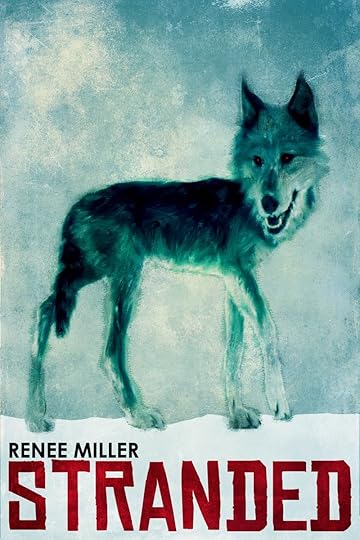
Stranded
By Renee Miller
My rating: 5 of 5 stars
Anybody who has been following my reviews for a while likely knows that I have a particular fondness for arctic-based horror. Drop a group of folks in the middle of a freezing and inhospitable terrain where they are blinded by snow, frostbitten, and mentally at their wits end and at each other’s throats, and let the blood spill. I love shit like that, and Renee Miller clearly does, as well.
Stranded has all of the above, plus a mysterious monster rooted in indigenous folklore. While the creature is of the rough and tumble sort, this book's cast is heavily loaded with plenty of greedy human monsters to root against, too. Half the fun of Stranded is in seeing a lot of these bastards get their comeuppance, and Miller does a fun job of thematically arguing the point that greed is the root of all evil.
A handful of contestants are picked to compete in a brand-new reality show called Stranded, an extreme survival show where the stakes are raised with a bit of matchmaking. The players are whisked off to a remote, uninhabited arctic island in the Canadian north to seek fame, fortune, and glory, but a few of them have some dark secrets they’re hoping to escape. There’s a corrupt cop hoping to circumvent the investigation into her pay-off from pimps, and an unstable sex addict on the edge. Not to mention the show’s skeevy creator, producers, and crew who won’t let trifling nuisances like a spate of murders and disappearances wreak havoc with their guaranteed hit.
As I said above, there’s a lot of people to root against, and not many to root for. Stranded gets pretty dark and readers who need likeable protagonists to cheer on will likely find a few things to fret about here. Me, I’m good with nasty people meeting their nasty end by way of even nastier supernatural forces, and in this regard Miller delivers all kinds of violent fun. What I most appreciated, though, were the subtle layers of commentary about greed and its relationship to the monstrous force at play here. Miller doesn’t beat her readers over the head with preachiness or demands for her audience to repent, but there is a nice bit of thematic meat on this novella’s bones.
Most of all, though, Stranded is a fun, quick read, the kind of pulpy entertainment that’s right up my alley and hits all my sweet spots. It’s got blood-drenched snow, a terrible climate for its characters to endure or succumb to, and a nifty creature to boot. Renee Miller has crafted a brutal tale of monsters and madness, one that will make your blood run cold. Perfect for fans of The Thing, Stranded is arctic terror at its chillingly scary best.
[Note: I received an advance reading copy of this title from the publisher, Unnerving, to provide a publication blurb. I have chosen to review Stranded, as well, because I dug the hell out of this novella and hope you will too.]
View all my reviews
Published on October 10, 2018 05:48



